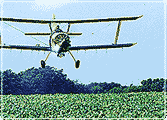 Agriculture – Pesticides
Agriculture – Pesticides
Pest – A ‘pest’ is an animal or plant living where humans do not want it to live.
Pesticide –A pesticide is a chemical used to kill pests (see activity for more information)
Crops and yields:
Crop yield can be reduced by:
- Interspecific competition with other species of plants (weeds)
- Competition for Light, Minerals and Water.
- Damage by pests such as insects
- Disease caused by fungi and viruses.
Crops are generally grown as a monoculture (only one plant species present), which provides an ideal place for pest populations to increase.
Worldwide, there are over 600 species of economically important weeds, several thousand pest insects and 1500 fungal or bacterial diseases. Controlling these factors using pesticides greatly increases production. If no pesticides were used, 25% of UK crop production would be lost.
The nature of Pesticides:
A great variety of chemicals are used as pesticides. They can be organic or inorganic. They are grouped by their actions e.g.
- Insecticides – kill insects
- Herbicides – kill weeds
- Fungicides – kill fungi
Pesticides work in the following main ways:
Contact pesticides
- sprayed directly onto crop and absorbed by the pest that get covered by the pesticide.
- Some pests may get missed by the spray.
Systemic pesticides
- Absorbed by the crop and transported inside plants.
- Kills aphids when they suck in plant juices.
- Not necessary to cover all insects by spray.
- Systemic herbicides absorbed by leaves and travel to all parts, killing roots.
- The herbicide may be may be selective and kill specific pests.
Residual pesticides
- Sprayed onto soil or seeds before planting and remain active in soil, which will kill fungal spores, insect eggs and larvae and weeds as they germinate.
Effective pesticides should be:
- Specific, only kill target pest, harmless to humans and other wildlife.
- Chemically stable but biodegradable, long shelf-life but broken down in soil.
- Cost effective
 Problems with Pesticides
Problems with Pesticides


What's your opinion?
Average rating




Not yet rated